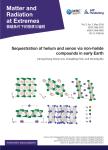Probing and possible application of the QED vacuum with micro-bubble implosions induced by ultra-intense laser pulses
作者机构:Kansai Photon Science InstituteNational Institutes for Quantum and Radiological Science and TechnologyKizugawaKyoto 619-0215Japan Institute of Laser EngineeringOsaka UniversityOsaka 565-0871Japan Department of Mechanical and Aerospace EngineeringUniversity of California at San DiegoLa JollaCalifornia 92093USA Extreme Light Infrastructure-Nuclear Physics(ELI-NP)/Horia Hulubei National Institute forR&Din PhysicsandNuclear Engineering(IFIN-HH)30 Reactorului St.P.O.Box MG-6Bucharest-MagureleJudet¸ul Ilfov RO-077125Romania
出 版 物:《Matter and Radiation at Extremes》 (极端条件下的物质与辐射(英文))
年 卷 期:2019年第4卷第3期
页 面:18-24页
核心收录:
学科分类:080901[工学-物理电子学] 0809[工学-电子科学与技术(可授工学、理学学位)] 08[工学] 080401[工学-精密仪器及机械] 0804[工学-仪器科学与技术] 0803[工学-光学工程]
基 金:Japan Society for the Promotion of Science KAKEN (17H02812)
主 题:laser polarization vacuum
摘 要:The interaction of micro-bubbles with ultra-intense laser pulses has been shown to generate ultra-high proton densities and correspondingly high electric *** the possibility of using such a combination to study the fundamental physical phenomenon of vacuum *** current or near-future laser systems,measurement of vacuum polarization via the bending of gamma rays that pass near imploded microbubbles may be *** it is independent of photon energy to within the leading-order solution of the Heisenberg–Euler Lagrangian and the geometric optics approximation,the corresponding index of refraction can dominate the indices of refraction due to other effects at sufficiently high photon *** consider the possibility of its application to a transient gamma-ray lens.



